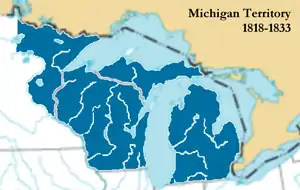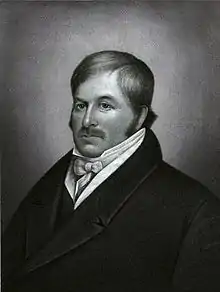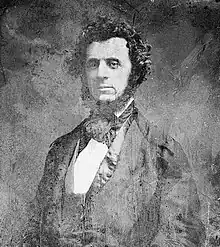Michigan Territory's at-large congressional district
Michigan Territory's at-large congressional district is an obsolete congressional district that encompassed the area of the Michigan Territory prior to admitting Michigan to the Union. The territory was established on June 30, 1805, from Indiana Territory. In 1819, the territory was given the authority to elect a congressional delegate until statehood in 1837.
| Michigan Territory's at-large congressional district | |
|---|---|
| Obsolete district | |
| Created | 1819, as a non-voting delegate was granted by Congress |
| Eliminated | 1837, as a result of statehood |
| Years active | 1819–1837 |

Michigan Territory between 1818 and 1833. Showing extent of the at-large congressional district for the majority of time prior to Michigan's statehood.
List of delegates representing the district
| Delegate | Party | Term | Cong ress |
Electoral history |
|---|---|---|---|---|
 William Woodbridge (Detroit) |
Democratic-Republican[1] | October 28, 1819 – August 9, 1820 |
16th | Elected October 28, 1819 and seated March 2, 1820. Resigned due to family illness. |
| Vacant | August 9, 1820 – November 20, 1820 |
|||
 Solomon Sibley (Detroit) |
Federalist[2][3] | November 20, 1820 – March 3, 1823 |
16th 17th |
Elected to finish Woodbridge's term.[4] Re-elected in 1821.[5] Retired. |
 Gabriel Richard (Detroit) |
Independent[6] | March 4, 1823 – March 3, 1825 |
18th | Elected in 1823. Lost re-election. |
.jpg.webp) Austin Eli Wing (Detroit) |
Anti-Jacksonian[7] | March 4, 1825 – March 3, 1829 |
19th 20th |
Elected in 1824. Re– elected in 1826. Retired. |
 John Biddle (Detroit) |
Jacksonian[8] | March 4, 1829 – February 21, 1831 |
21st | Elected in 1828. Retired and resigned before next term. |
| Vacant | February 21, 1831 – March 3, 1831 |
|||
.jpg.webp) Austin Eli Wing (Monroe) |
Anti-Jacksonian[7] | March 4, 1831 – March 3, 1833 |
22nd | Elected in 1830. Retired. |
 Lucius Lyon (Bronson) |
Jacksonian[9] | March 4, 1833 – March 3, 1835 |
23rd | Elected in 1832. Retired. |
 George Wallace Jones (Sinsinawa Mound) |
Jacksonian[10] | March 4, 1835 – June 15, 1836 |
24th | Elected in 1834. Seated as the delegate from Wisconsin Territory in December 1836. Deciding a contested election in December 1838, the House Committee on Elections determined that his service as delegate from Michigan Territory ended June 15, 1836.[11] |
See also
Notes
- Formisano, Ronald P. (1971). The Birth of Mass Political Parties: Michigan, 1827-1861. Princeton, NJ: Princeton University Press. p. 65. ISBN 978-1-4008-6844-5 – via Google Books.
- Burton, Clarence M., ed. (1922). The City of Detroit Michigan 1701-1922. Vol. I. Chicago, IL: S. J. Calrke Publishing Company. p. 277 – via Google Books.
- Gilman, Rhoda R. (2004). Henry Hastings Sibley: Divided Heart. Saint Paul, MN: Minnesota Historical Society Press. p. 17. ISBN 978-0-8735-1484-2 – via Google Books.
- "A New Nation Votes". elections.lib.tufts.edu.
- "A New Nation Votes". elections.lib.tufts.edu.
- Ross, Robert Budd (1907). The Early Bench and Bar of Detroit from 1805 to the End of 1850. Detroit, MI: Richard P. Joy and Clarence M. Burton. p. 9 – via Google Books.
- Formisano, p. 69.
- Bradley, Cyrus P. (April 1, 1906). "Journal of Cyrus P. Bradley". Ohio Archaeological and History Quarterly. Columbus, OH: Ohio Archaeological and Historical Society. p. 256 – via Google Books.
- Congressional Quarterly's Desk Reference on American Government. Washington, DC: CQ Press. 1995. p. 137. ISBN 978-0-8718-7956-1 – via Google Books.
- Rodolf, Theodore (1900). "Pioneering in Wisconsin Lead Region". Collections of the State Historical Society of Wisconsin. Vol. XV. Madison, WI: Democrat Printing Company. p. 359 – via Google Books.
- Hinds 1907, pp. 369–370.
References
- Hinds, Asher C. (1907), Hinds' Precedents of the House of Representatives, vol. 1, Government Printing Office, retrieved October 16, 2019
- "Our Campaigns - United States - Territory of Michigan - MI Territorial Delegate". www.ourcampaigns.com. Retrieved January 7, 2021.
This article is issued from Wikipedia. The text is licensed under Creative Commons - Attribution - Sharealike. Additional terms may apply for the media files.